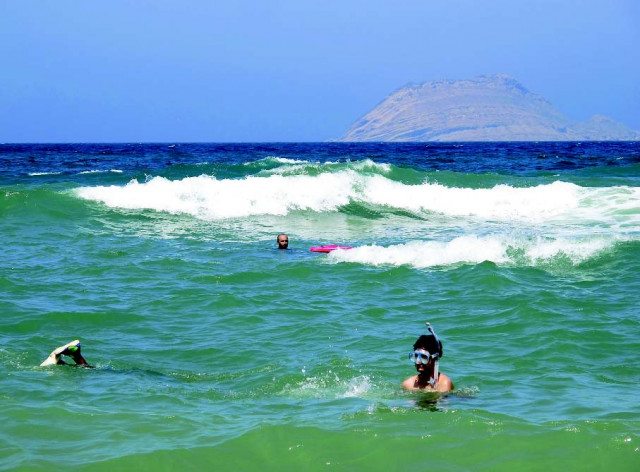SHEHRI launches documentary on Karachi’s coast
The documentary explores the effects of development and land reclamation on Karachi’s coast.

SHEHRI launches documentary on Karachi’s coast
Shehri-CBE, a Karachi-based non-profit organisation, launched a documentary on “Sahil - the coast of Karachi” at Avari hotel on Wednesday. “We should show it to the bureaucrats and the lawmakers and maybe then they will feel they should do something,” remarked another member of the audience.
The documentary explores the effects of development and land reclamation on Karachi’s coast and the life forms associated with it. It was shot at the different settlements located along the entire 370-kilometre coastline and depicts how over the years our coastal riches have been plundered by big business and left ignored by the authorities.
The documentary highlights, with the help of aerial photography, maps, animation, graphics and Google imaging, the encroachment and reclamation of coastal land and drainage channels. It explores unplanned coastal or waterfront development, land-based pollution discharge, unregulated exploitation of coastal resources, a lack of conservation and legal and regulatory control and incorporates the views of various stakeholders and experts.
Mahira Omar, the managing director of MO Productions, who was the eye behind the lens and the brain behind the concept, said that besides its diversity, our coast is also losing its cultural diversity with time. “While I was making the documentary a fisherman told me that some 30 to 40 years ago when he used to step in the sea, he could see his own feet through the water and small fish but that is no more the case,” she recalled.
Cattle Colony manure, industrial effluent, shorn mangroves, and sewage are dumped directly into the waters to seriously affect its life forms and natural diversity. Our backwaters of Sandspit and other shores are very dirty because of the pollution caused by the Lyari river, she said. “Hawke’s Bay and Sandspit are among the 11 most important beaches around the globe where marine turtles come to lay their eggs and yet we don’t preserve them,” she said.
Experts shed light on the waterfront development projects by Defence Housing Authority in Phase VIII, the Golf Club on reclaimed land, and private projects by foreign construction giants on the beach front and beach islands such as Crescent Bay, the Diamond Island City, Sugar Line City, and the reclamation of the Boat Basin backwaters. Not only have they seriously congested the water and its diversity but they have also had an impact on the city’s sewerage system.
Talking about the government’s resolve for coastal protection, Mir Hussain Ali, the secretary for environment and alternate energy, said that they are planning to improve the system of waste management and land utilisation to protect the coast from pollution.
Rehri Goth resident Mehmood complained that the entire city’s solid waste was being dumped in his area because of which children were becoming disabled and contracting Hepatitis C and cancer. Secretary Mir Hussain Ali said that unfortunately Karachi’s towns had a haywire system of waste management in which they dumped the waste at a point from where it was taken to a landfill site. This is going to change, he added.
Arif Hasan, a town planner and architect, said that the sea of Karachi’s coast has seen many cyclones but that of 1906 was the worst. “It can come again,” he warned, adding that we should be prepared and protect the mangroves that can offer protection in return.
The documentary is available at the Shehri offices for Rs100 per CD.
Published in The Express Tribune, August 12th, 2010.



















COMMENTS
Comments are moderated and generally will be posted if they are on-topic and not abusive.
For more information, please see our Comments FAQ